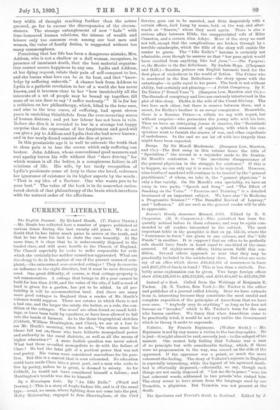CURRENT LITERATURE.
The English Peasant. By Richard Heath. (T. Fisher Unwin.) —Mr. Heath has collected here a number of papers published at various times during the last twenty odd years. We do not doubt that lie has taken much pains to arrive at the truth, and that he has done his best to state the case honestly. At the same time, it is clear that he is unfavourably disposed to the landed class, and still more hostile to the Church of England. The Church especially ho seeks to make responsible for evils which she certainly has neither caused nor aggravated. What are the clergy to do in the matter of one of the gravest causes of com- plaint,—the ruinourand over-crowded cottages ? They do exercise an influence in the right direction, but it must be most discreetly used. One great difficulty, of course, is that cottage-property is not remunerative. A cottage that brings in £3 a year cannot be built for less than £130, and the value of the site, if half-a-rood of land is given for a garden, has yet to be added. In all pro- bability it will be accommodation land. And there are many more good cottages in England than a reader of Mr. Heath's volumes would suppose. There are estates in which there is not a bad one, and the larger the estate the better, as a rule, the con- dition of the cottages. The worsts are often found on small hold- ings, or have been built by squatters, or have been allowed to fall into the hands of farmers. As to the three biographical sketches ,(Cobbett, William Huntington, and Clare), we are at a loss to see Mr. Heath's meaning, when he asks, "On whom must the blame fall but ono those who have hitherto monopolised power and authority in the rural districts, as well as all the means of higher education P" A. more foolish question was never asked. What had these so-called monopolists to do with the failure of Clare ? He had the fatal gift of a poetical power that was not real poetry. His verses were considered marvellous for his posi- tion. But this is a marvel that is soon exhausted. No education could have made Clare into a great poet, and a man who seeks to live by poetry, unless he is great, is doomed to misery, As for Cobbett, he would not have considered himself a failure ; and Huntington's trouble was duo to himself.


































 Previous page
Previous page